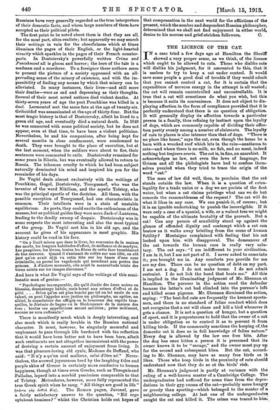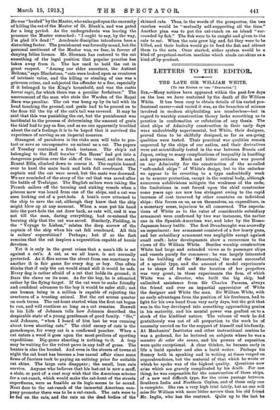THE LICENCE OF THE CAT.
IN a case tried a few days ago at Hamilton the Sheriff showed a very proper sense, as we think, of the licence which ought to be allowed to cats. Those who dislike cats will dislike his judgment, for it amounted to this, that it is useless to try to keep a cat under control. It would save some people a good deal of trouble if they would admit that you cannot control a cat, for it is certain that the expenditure of nervous energy in the attempt is all wasted ; the cat will remain uncontrolled and uncontrollable. It is true that a cat will sometimes do what you wish, but this is because it suits its convenience. It does not object to dis- playing affection in the form of compliance provided that it is perfectly understood that there is no question of obligation. It will generally display its affection towards a particular person in a family, thus refining by instinct upon the loyalty of dogs, which are commonly capable of dividing their affec- tion pretty evenly among a number of claimants. The loyalty of cats to places is also intenser than that of dogs. " There is no place like home," says the cat, even though the home be a barn with a wrecked roof which lets in the rain—anathema to cats—and where there is no milk, no fish, and no meat, indeed nothing but taujaurs souris. The cat is, in fine, an anarchist. It acknowledges no law, not even the laws of language, for Grimm and all the philologists have had to confess them- selves puzzled when they tried to trace the origin of the word " cat."
The man of law did well, then, to proclaim that the cat stands outside the law. When it is a question of extra- legality for a trade union or a dog we are purists of the first water, but when a cat claims privilege what can we do but concede the reasonableness of the request ? The cat will do what it likes in any case. We can punish it, of course; but it is an ignoble undertaking to punish the incorrigible. If it were only a case of a spaniel, a wife, or a walnut tree we might be capable of the ultimate brutality of the proverb. But a cat! Can any person of sensibility stand up against the glance of offended dignity and contempt which a cat can bestow as it walks away bristling from the scene of human futility ? Montaigne complained with feeling that his cat looked upon him with disapproval. The demeanour of the cat towards the human race is really very salu- tary. The cat says : "I am indifferent to your civilization. I am in it, but I am not part of it. I never asked to come into it; you brought me in. Any comforts you provide for me are my due. There can be no question of debt on my part. I am not a dog. I do not make terms. I do not admit restraint. I do not lick the hand that beats me." All this is implied in the illuminating judgment of Mr. Shennan at Hamilton. The pursuer in the action sued the defender because the latter's cat had climbed into the pursuer's loft and killed some pigeons. Mr. Shennan dismissed the action, saying: " The best-fed cats are frequently the keenest sports- men, and there is no standard of feline conduct which does not recognize that a cat will chase and kill a bird whenever it gets a chance. It is not a question of hunger, but a question of sport, and it is preposterous to hold that the owner of a cat is under obligation so to control it as to prevent it from killing birds. If the community sanctions the keeping of.the domestic cat it does so in full knowledge of feline nature." Every dog is allowed by the law one free bite. After the dog has once bitten a person it is presumed that its owner knows it to be "savage," and the owner must pay up for the second and subsequent bites. But the cat, accord- ing to Mr. Shennan, may have as many free birds as it likes. Those who keep birds in the proximity of cats should understand now that they do so at the birds' risk.
Mr. Shennan's judgment is partly at variance with the ruling of a well-known master of a Cambridge College. The undergraduates had suffered for some time from the depre-
dations in their gyp rooms of the cat—probably more hungry or greedy than sporting—which belonged to the master of a
neighbouring college. At last one of the undergraduates caught the cat and killed it. The crime was traced to him., Re was "hauled" by the Master, who enlarged upon the enormity of killing the cat of the Master of St. Blank's, and was gated for a long period. As the undergraduate was leaving the presence the Master remarked: "I ought to say, by the way, I'm glad it's dead !" Academic discipline introduces here a disturbing factor. The punishment was formally sound, but the personal sentiment of the Master was, we fear, in favour of denying feline licence. Mr. Shennan has restored to the cat something of the legal position that popular practice has taken away from it. The law used to hold the cat in great respect. "Among our elder ancestors, the Antient Britons," says Blackstone, "cats were looked upon as creatures of intrinsic value, and the killing or stealing of one was a grievous crime, and subjected the offender to a fine, especially if it belonged to the King's household, and was the custos korrei regii, for which there was a peculiar forfeiture." The amercement of the man who stole the Warden of the Royal Barn was peculiar. The cat was hung up by its tail with its head touching the ground, and grain had to be poured on to the floor till the tip of the cat's tail was covered. It may be said that this was punishing the cat, but the punishment was incidental to the process of determining the amount of grain the thief had to pay as fine, and as no one apparently troubled about the cat's feelings it is to he hoped that it survived the experience of serving as an imperial measure.
Strangest of paradoxes is the risks men will take to pro- tect or save so unresponsive an animal as a cat. The papers of Tuesday contained a fresh instance. The ship's cat belonging to the Hull trawler ' Sea Horse' had got into a dangerous position over the side of the vessel, and the mate, Ernest Ellis, climbed down to rescue it. The captain leaned over to haul the mate back and both fell overboard. The captain and the cat were saved, but the mate was drowned. We are reminded of the story of the cat that was saved after the battle of Trafalgar. The English sailors were taking the French sailors off the burning and sinking vessels when a piteous mew was heard from one of the ships, and a cat was seen looking out of a port-hole. A boat's crew returned to the ship to save the cat, although they knew that the ship might blow up at any moment. When a man put his band into the port-hole the cat drew back, as cats will, and it was not till the man, daring everything, had re-entered the burning ship that the cat was saved. Similarly, Fielding, in the " Voyage to Lisbon," relates the deep sorrow of the captain of the ship when his cat fell overboard. All this is sailors' superstition? Perhaps ; but if so the fact remains that the cat inspires a superstition capable of heroic devotion.
Yet it is only in the great crises that a man's life is set against a cat's. A cat, as we all know, is not normally protected. As it flies across the street from one sanctuary to another it is fair game for every dog or boy. One often thinks that if only the cat would stand still it would be safe. Every dog is rather afraid of a cat that bolds its ground; it fears the claws on its nose. As for the boy, he is attracted rather by the flying target. If the cat were to make friendly and confident advances to the boy it would be safer still; not one human being in a million is capable of rejecting the overtures of a trusting animal. But the cat scorns quarter on such terms. The cat-hunt started when the first cat began to run, and will continue so long as a cat remains. Boswell in his Life of Johnson tells how Johnson described the despicable state of a young gentleman of good family. "Sir," said Johnson, "when I heard of him last he was running about town shooting cats." The chief enemy of cats is the gamekeeper, for every cat is a confirmed poacher. When a cat enters a wood it goes upon the most perilous of sporting expeditions. Big-game shooting is nothing to it. A trap may be waiting for the velvet paws in any tuft of grass. The bunter is also the hunted. And even in the streets of towns at night the cat hunt has become a less casual affair since some firms of furriers took to paying an enticing price for suitable cat skins. The large cats disappear ; the small, lean cats survive. Anyone who believes that his lost cat is now a muff, a stole, or part of a coat may wish that the American scheme for a cat-ranch, which would make the cat-hunt of the streets superfluous, were as feasible as its logic seems to be sound. Next door to the cat-ranch of the immortal American com- pany promoter there was to be a rat-ranch. The cats were to be fed on the rats, and the rats on the dead bodies of the
skinned cats. Thus, in the words of the prospectus, the two ranches would be "mutually self-supporting all the time." Another plan was to put the cat-ranch on an island "sur- rounded by fish." The fish were to be caught and given to the cats to eat. When the cats grew big and fat they were to be killed, and their bodies would go to feed the fish and attract them to the nets. Once started, either system would be a kind of perpetual-motion machine which sheds cat-skins as a kind of by-product.















































 Previous page
Previous page